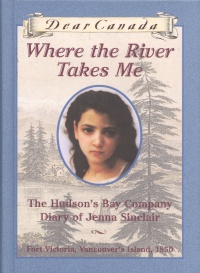| ________________
CM . . . . Volume XV Number 9. . . .December 19, 2008 
 |
Where The River Takes Me: The Hudson's Bay Diary of Jenna Sinclair, Fort Victoria, Vancouver's Island, 1859. (Dear Canada).
Julie Lawson.
Toronto, ON: Scholastic Canada, 2007/2008.
283 pp., hardcover, $19.99.
ISBN 978-0-439-95620-8.
Subject Headings:
Hudson's Bay Company-Juvenile fiction.
Grades 5-8 / Ages 10-13.
Review by Ruth Sands.
**** /4
|
| |
|

excerpt:
Saturday, August 24th
This morning I went to the meadow and saw Kwetlal again. She was digging camas with the others, tho' there were not as many as last week, which makes me think the harvest might be coming to an end. When I approached her, she remembered my name and looked happy to see me. It turns out she speaks and understands a little bit of English and when she pointed towards the Fort, mimed the act of paddling a canoe and said brother and father, I guessed that she might have learned some words from a relative who works for the company. Maybe her brother or father was one of the paddlers who brought me from Fort Langley. We played a few more guessing games – including one in which I tried to explain that my mother and father were dead, but not my grandmother. I must have used the right gestures for she smiled, seeming to understand, and took me meet her grandmother, the woman I had seen telling stories. I managed to get across that she reminded me of my grandmother.
I had never seen a camas root up close so I took the opportunity and looked into Kwetlal's basket. Camas? I said. They looked more like bulbs than roots, but Mrs. Staines had been right about the name for it, on hearing camas Kwetlal gave a delighted grin, handed me a pointed stick and showed me how to use it. (Now I wonder if I might have pronounced camas incorrectly, and said something that means Let me help with the digging. ) It was not as easy as it looked.
Where the River Takes Me, by Julie Lawson, part of Scholastic's Dear Canada series, is the fictional diary of 12-year-old Jenna Sinclair, a resident of Fort Edmonton in 1849. Orphaned by the death of her father the previous year, Jenna is left in the care of her Aunt Grace and is about to start on a great adventure. Aunt Grace is getting married, and her new husband has been reassigned to Fort Coleville. Jenna oscillates between sadness at the thought of leaving her friends and her grandmother and excitement at the thought of the journey ahead. Once they reach Fort
Coleville, Jenna discovers that she has a very restless spirit, and she wants to go away to school. Some of the other children at the fort will be heading to a school in Fort Victoria, and Julie manages to convince her aunt that she should be allowed to go as well. Jenna's diary is filled with
entries about traveling, life in the Forts and one very spectacular and scary event that takes place towards the end of her first year at school.
What a fantastic way to teach children about life in early Canada. While Jenna is a fictional character, she is based on solid research about what a young girl in 1859 Canada might have experienced. Through the diary entries, Jenna explains to the reader about methods of travel, about life inside a fort and about the life of people on the plains. History comes alive in a way never accomplished by my teachers in school. Because Jenna is so alive on the page, I had to keep reminding myself that she wasn't real as I read the novel. The reader is constantly given an overview of life in the late 1800's while making a connection with a very believable character. As a lifelong resident of Vancouver, I found the book to be even more engaging as I have been to Fort Langley on numerous occasions, but only now do I have a real sense of its importance in history. And imagine, crossing from the mainland to Victoria, not on a BC ferry, but in a canoe.
Lawson's book has brought history to life. She has perfectly conveyed the voice of a young girl, and Jenna makes a connection with the reader because she seems so alive. The diary format of the book is very realistic, and the epilogue, which sums up the rest of Jenna's life, only adds to the reader's belief that this may have been a real child. Where The River Takes Me is a very good novel for anyone who even has a passing interest in Canadian history.
Highly Recommended.
Ruth Sands is a freelance writer from Vancouver, BC.

To comment on this title or this review, send mail to
cm@umanitoba.ca.
Copyright © the Manitoba Library Association. Reproduction for personal use is permitted only if this copyright notice is maintained. Any other reproduction is prohibited without permission.
NEXT REVIEW |
TABLE OF CONTENTS FOR THIS ISSUE- December 19, 2008.
AUTHORS |
TITLES |
MEDIA REVIEWS |
PROFILES |
BACK ISSUES |
SEARCH |
CMARCHIVE |
HOME |
